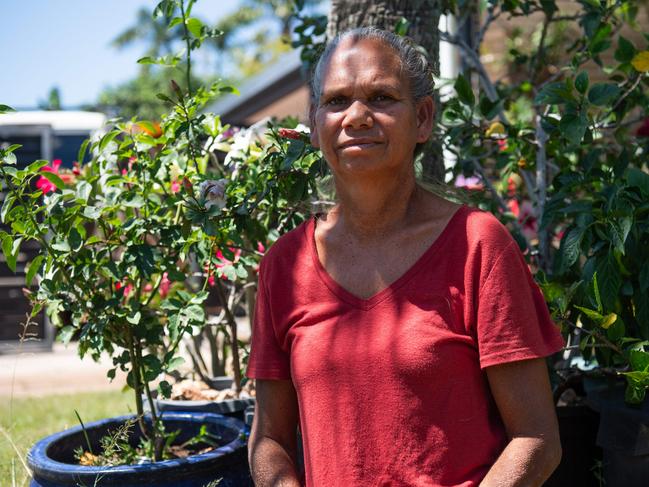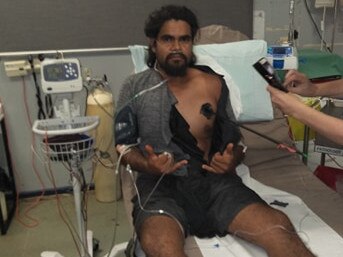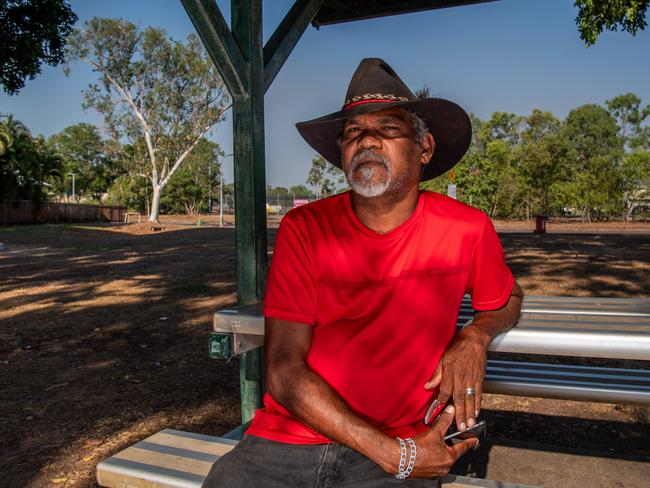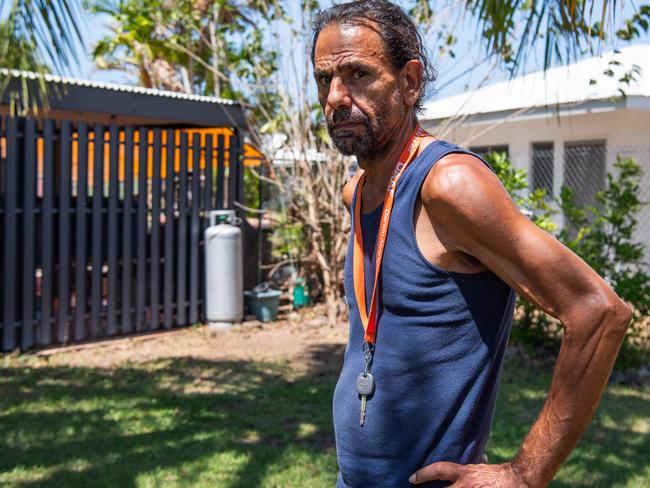Peppimenarti TOs call for crossbow ban as Jovi Boys gang takes over remote NT town
A grandmother hides young children in a bathroom as a violent gang surrounds her home, some armed with crossbows. This is the daily reality in an ‘out of control’ remote NT town. Warning: Graphic images
Police & Courts
Don't miss out on the headlines from Police & Courts. Followed categories will be added to My News.
Leaders in an NT Aboriginal community where a man was killed by a crossbow last year are calling for the weapons to be outlawed as the Jovi Boys continue to terrorise its law-abiding residents.
Peppimenarti Traditional Owner Annunciata Nunuk Wilson and her partner Karl Lukanovic say they call their house “the Gaza Strip” because it is on the “front line” of an ongoing war being waged by the notorious gang.
Ms Wilson said she had been living in a tent since the Jovi Boys ran her out of her home in January, before gang members then tried to burn it down earlier this month.
“I had about five (grandchildren) in the house, all little boys, aged from 5 all the way to 11,” she said.
“About 40 young fellas gathered up at the school about 300m away from where my house is located.
“I was actually in the house and kids was playing outside and I warned them there’s going to be an attack, I want you to come in and I told them I’m going to put them in the bathroom where it’s safe.
“It just went on for about an hour and while we were inside I was ringing triple-0 and just constantly getting attacked while we were in the house.”

Community members are now calling on the Territory government to do more to save them from the relentless attacks, including by toughening current laws “by prohibiting the sale of
crossbows altogether, or at the very least, by bringing NT legislation and regulations in line with the rest of Australia”.
Ms Wilson, whose son was the victim of a horrifying crossbow attack in 2020 and whose nephew was killed with the same weapon in September last year, said crossbows should be treated like guns.
“It’s like purchasing a rifle from a gun shop, you know, you have to show your licence, because that thing it can kill — it did kill,” she said.
“They should show their ID to purchase, and put it away in a gun safe or something like that.”
A government spokeswoman said some “versions of a crossbow” were already classified as prohibited or controlled weapons but made no mention of any plans to toughen legislation.
“NT Police and government continue to work with the Peppimenarti community to ensure the safety of all residents, this includes through additional police resources on the ground,” she said.
“Under NT Legislation, NT Police still have the powers to seize weapons they believe have been, or are likely to be used in a crime.”

It also follows a series of bail and weapons reforms passed by the NT parliament this year after the fatal stabbing of Airport Tavern BWS worker Declan Laverty in March.
In an emotional parliamentary sitting on Tuesday, Chief Minister Natasha Fyles detailed measures the government had taken in the wake of his death, including legislating a presumption against bail for violent weapons offences and a new knife crime strategy.
Deewin Kirim Aboriginal Corporation chief executive Ray Whear said the response to Ms Wilson’s pleas was in stark contrast with “how quickly the government acted when a white bottle shop worker was stabbed with a bladed weapon”.
“And yet people are being killed and severely injured (in Peppimenarti),” he said.
“How many more people need to be killed or seriously injured until they do change this law?”

Resident Karl Lukanovic said he and Ms Wilson had been attacked by Jovi Boys so many times their home now felt more like a prison.
“Peppimenarti’s good name as one of the best remote area communities in the Top End or the NT has been dragged through the mud, has been tarnished, it’s going to take decades to probably get that name back up to normal,” he said.
“As soon as people hear you’re from Peppimenarti they kind of cringe and then you tell them your story and they have tears.
“Enough is enough, we want to have good outcomes and good opportunities for our young people for the future, not violence.
“We live in a society where everyone should be happy and getting on with each other, not living in a war zone.”
Local school no longer safe as Jovi Boys gang violence spirals out of control
Peppimenarti’s health clinic and shop have become the latest victims in the series of relentless attacks.
Traditional Owner and West Daly Regional Council member John Wilson said the latest incident was just another example of the “so called Jovi Gang” members “running around with machete and axe, throwing louvres from the houses that have been broken into”.
“Last night they was smashing cars again, the health clinic emergency service car, ambulance, got smashed,” he said.
“The shop car got smashed by this Jovi Gang and the shop manager lady got attacked by them by rocks and rang triple-0 again.”
Mr Wilson said the town’s Elders had tried reasoning with the Jovi Boys without success, while the efforts of law enforcement had been ineffective at best.
“We tried several times (to talk to them), they apologised, my boys, family, apologised with them in front of the coppers and the next thing you can see torch light coming over late at night, wanna fight again,” he said.
“They got no respect whatsoever.”

Mr Wilson said the situation had gotten so bad, many families had pulled their children out of the local school after it was repeatedly targeted.
“They come there, throw rocks at school, throw axe at kids, been reported several times, nothing been done, they’re too frightened to go to school — no one would send their kids to school if they’ve been attacked from idiots,” he said.
“We want to go back to that lifestyle that we get up in the morning, kids go to school, parents go to work, kids come back to their home where they should be, not in tents.
“They’re just terrorising the community and they should be arrested and when they get arrested not taken back to the community, move them on.”
Karl Lukanovic, who has lived in Peppimenarti for the past two decades, said parents in a particular part of the town “do not want to acknowledge their children are causing trouble because they’re troublemakers themselves”.
“Domestic violence down that end of town is out of control,” he said.
“Police, I don’t know what they’re doing, (gang members) come into town, steal cars, they go round to all the bottle shops, steal all the grog, go back there give their older people grog, go to Port Keats and sell it for $500 a bottle.”
Mr Lukanovic said recent bail reforms were useless in Peppimenarti where the police presence was “insufficient”.

He called on the Territory government to do more to try to stop the violence.
“The NT government does not care, NT Police, they’re walking on eggshells, they’re not helping people,” he said.
“The judicial system really needs to be changed, this bail they keep on getting, they’re out on the street, these are repeat offenders.
“I reckon really what has to happen with juvenile crime is they need to go out bush and do work camps.
“It’s got to change, you’ve got to show them ‘Look, you’re going to be punished properly boy, and you’ve got to go work’, you’ve got to teach people to learn how to respect others and your community.”
NT Police responded to questions about the unrest without making any direct reference to Peppimenarti.
Instead, a spokeswoman for the force said police were “committed to ensuring the safety of all residents, including those in remote communities”.
“Addressing anti-social behaviour is not just a policing issue but requires collaboration and co-operation from the community,” she said.
“While law enforcement plays a critical role in preventing and responding to incidents of anti-social behaviour, long-term solutions require a holistic approach that involves other stakeholders such as government agencies, community leaders and social service organisations.”
The spokeswoman said addressing root causes such as poverty, social exclusion and mental health problems required “a co-ordinated effort beyond the traditional law enforcement role”.
She said while NT Police recognised its role in controlling the use of weapons, it was “not solely the responsibility of the police”.
“Effective management of weapon control requires a collaborative effort involving all community members, including community leaders, government agencies and other stakeholders,” she said.





